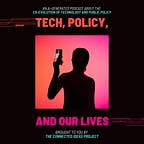I still remember the moment it hit me. It was past midnight in a near-empty office, and I was huddled over a draft policy memo on biotech. My task was to outline guidelines for biotech-enabled military systems that didn’t even exist yet. I found myself scribbling notes about self-driving labs, “rogue” machine biohackers, and fail-safe mechanisms, essentially spinning a story about a hypothetical future. That’s when I had the aha moment - I wasn’t just writing policy. I was writing science fiction.
All those years devouring Asimov, Le Guin, and Gibson, and here I was, deep in the Pentagon, doing the same thing, except instead of calling it a novel, I called it a policy memo. Instead of plot twists, I had clauses. Instead of world-building for a fictional reader, I was world-building for lawmakers.
And I realized: policy is often speculative fiction in disguise.
I’m not alone in this realization. Scholars have pointed out that speculation is an innate part of policymaking. Law professor Matthew Boaz, for instance, argues that “speculative fiction… can be useful for conceiving of future policy… this specific narrative form is inextricably bound up with the law because speculation is such an innate part of policy making.” In other words, every bill, regulation, and defense strategy is a tiny work of speculative fiction - an attempt to imagine and shape a future world.
The question isn’t whether fiction influences policy. It’s how consciously we use it.
The podcast audio was AI-generated using Google’s NotebookLM. It also pronounces the movie GATTACA as “gah-tak-ah” ;-) Oh AI…
Government Work Runs on What-Ifs
Once I saw it, I couldn’t un-see it.
Policy memos started reading like story outlines. A proposal to regulate autonomous drones conjured images straight out of a techno-thriller: swarms of self-guided quadcopters policing city skies. A legislative hearing on human genome editing felt like a sequel to Brave New World, with phrases like “genetic caste system” thrown around. Even in AI safety debates, someone inevitably muttered, “We don’t want a Terminator scenario on our hands.”
And the more I worked in policy, the more I realized: we’re already using fiction as a policy tool - just poorly.
Take Gattaca (1997). That dystopian vision of a genetic meritocracy didn’t just entertain audiences, it helped shape real legislation. The Genetic Information Nondiscrimination Act (GINA) of 2008 was drafted, in part, to prevent a Gattaca-like future where DNA determines job eligibility and insurance rates. During congressional hearings, lawmakers referenced the film to illustrate why genetic privacy laws were necessary.
Or take Minority Report (2002). The concept of “pre-crime” policing, where AI predicts who will commit crimes, has now bled into reality with predictive policing software. But here’s the twist: while the film depicted this system as dystopian, some U.S. law enforcement agencies saw it as a blueprint - until public backlash, fueled by the film’s cautionary framing, slowed its adoption.
Fiction doesn’t just shape what policies we support, it also determines which ones we fear. It beta-tests the future before we live it.
I wanted to dive deeper into this topic for you. If you’re a regular TCIP reader, you know I’m a big sci-fi fan and have been exploring these topics through short stories.
I wrote you an Exclusive for Subscribers, long-form piece, titled “Science Fiction as a Policy Medium”.
It's >10,000 words, so I’m sharing here rather than yet another email directly to your inbox, but I’d welcome your thoughts and feedback. If you’re tired of sound bites:
The Strange Feedback Loop of Science Fiction and Policy
We like to think that science fiction predicts the future. But the reality is we’ve created a loop where fiction imagines a world, policy reacts to it, and then policy makes fiction come true.
Take the Space Force. That might sound like the brainchild of military strategists but in truth, the idea of a dedicated space military was first planted in fiction. Heinlein’s Starship Troopers (1959) was the first sci-fi novel to imagine a militarized space unit, long before the U.S. government considered one. Later, Star Trek introduced the United Federation of Planets, which shaped real-world thinking on space law and diplomacy.
In 2018, when the U.S. officially launched Space Force, public reactions were split between treating it as a necessity and mocking it as science fiction. Why? Because the narrative wasn’t original, it had existed in pop culture for decades.
The same thing happened with AI ethics. Decades before AI governance entered serious debate, Asimov’s Three Laws of Robotics (introduced in 1942) laid out principles for ensuring AI safety. Now, European lawmakers cite Asimov in official AI ethics discussions. A fictional set of “laws” from a mid-century sci-fi novel is now guiding real policy decisions in the 21st century.
This raises an interesting question:
Who’s really writing the future - policymakers or sci-fi authors?
Why Policymakers Need to Think Like Sci-Fi Writers
Science fiction doesn’t just predict the future, it creates the cognitive scaffolding for how we perceive it. That’s why policymakers need to be intentional about our relationship with fiction.
Instead of accidentally borrowing from sci-fi, we should consciously collaborate with it.
Scenario Workshops → Some governments are already inviting sci-fi writers into policy discussions. In 2019, NATO commissioned a science fiction graphic novel, NATO 2099, to explore future military conflicts.
Sci-Fi Policy Prototyping → Organizations like Arizona State University’s Center for Science and the Imagination now pair authors with policymakers to test futuristic policy scenarios.
Narrative Stress-Testing → Before a law is passed, lawmakers should ask what sci-fi narrative it fits into. Are we writing Star Trek, or Black Mirror?
Sci-fi shouldn’t just be entertainment for policymakers, it should be a tool.
The Future is a Story—Who Gets to Write It?
Here’s the fundamental truth:
The future isn’t a fixed destination. It’s a story we’re writing in real-time.
Science fiction and policy are two sides of the same coin—one imagines possibilities, the other enforces them. If we ignore sci-fi, we risk accidentally stumbling into dystopias. If we use it well, we can design a better future before it arrives.
Because at the end of the day, whether you’re a novelist or a policymaker, you’re answering the same question:
What if?
And if we don’t like the story we’re heading toward?
Then it’s time to rewrite it.
If you find this interesting, I’d love to hear from you. What’s a sci-fi idea that’s shaping the real world today? Drop me a reply and let’s keep the conversation going.
Cheers,
—Titus














